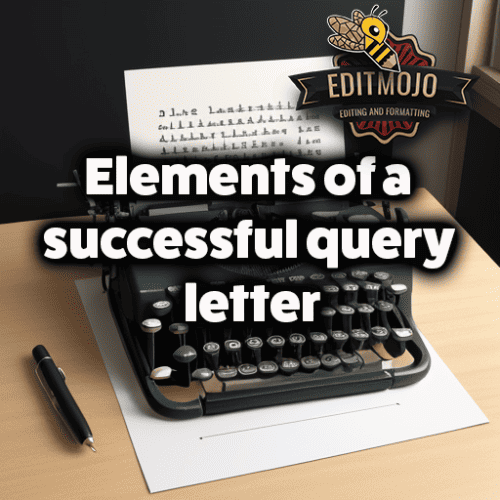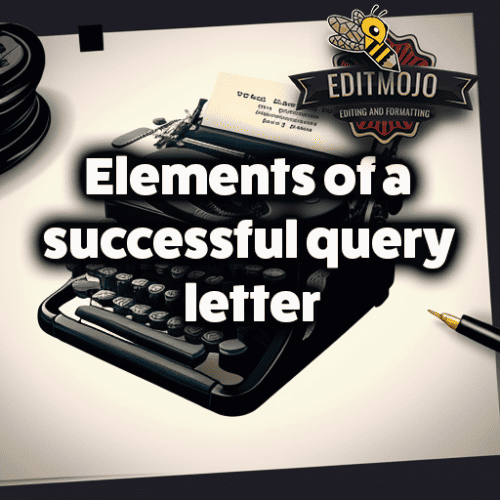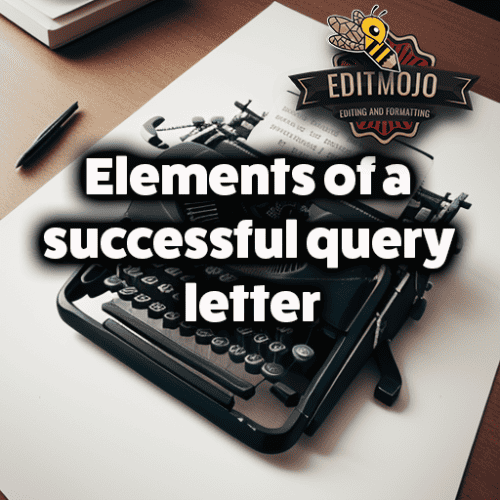Elements of a successful query letter
Elements of a successful query letter. Writing is a journey of passion, patience, and perseverance. But, what bridges the gap between your manuscript and its potential publisher? It’s the query letter – the unsung hero that could open doors to the literary world. A well-crafted query letter is your first step towards getting published. It’s crucial to understand its structure, elements, and the magic it needs to weave to enchant a literary agent or a publisher.
Key Takeaways
| Component | Key Points |
|---|---|
| Salutation | Research your recipient and address them correctly |
| Hook | Create an intriguing opening line to grab the reader’s attention |
| Synopsis | Introduce characters, conflict, and stakes without spoiling the plot |
| Bio | Share relevant professional and personal background information |
| Personalization | Show your familiarity with the agent/editor’s work |
| Common Mistakes | Avoid long/short letters, revealing the ending, spelling errors, and boastful tone |
| Revision | Use beta readers, writing groups, or professional editing services for feedback |
| Handling Rejections | Understand the reasons and use them as a learning opportunity |
| Examples and Analysis | Review successful query letters to understand their effective elements |
| Resources | Utilize online resources, books, and workshops to help in crafting your query letter |
Understanding the Basics of a Query Letter
A query letter is essentially your manuscript’s job application. It introduces your work, markets its unique features, and reveals a bit about the author behind the words. It’s more than just a letter; it’s a sales pitch. The aim is to captivate, convince, and compel the reader to request your full manuscript. It sounds like a hefty task, right? However, by understanding the anatomy of a successful query letter, you can break it down into manageable components.
The Anatomy of a Successful Query Letter

The Salutation
Would you start a job interview without knowing your interviewer’s name? Of course not! Similarly, addressing your query letter correctly is the first step towards a positive impression. Begin by researching the agent or editor’s submission preferences and personalizing your letter with their name. Remember, “Dear Agent” can’t compete with a well-researched and personalized greeting.
The Hook
Consider this: agents and editors might go through hundreds of query letters in a day. Your job is to make yours memorable. It all starts with the hook – your opening line. Just like the first line of a novel, your query letter’s opening should pique curiosity and promise an intriguing narrative. For instance, a hook like “What would you do if you woke up to find all the world’s water had disappeared?” immediately raises questions and draws the reader in.
The Synopsis
Now comes the part where you’ve got to compress your 300-page novel into just a few sentences. The synopsis is about giving a taste of your story, introducing your main characters, their conflicts, and the stakes. It’s a delicate balancing act of revealing just enough to intrigue but not enough to spoil. This isn’t the place to give away your plot twists or the ending. Let your reader savor the suspense!
The Bio
A query letter isn’t complete without the author’s bio, but tread carefully here. This isn’t an exercise in narcissism, but an opportunity to share any writing credentials, relevant experiences, or personal insights that add to your story’s appeal. Maybe you’re a marine biologist writing about mysterious happenings in the deep sea or a retired detective penning a gritty crime thriller. In each case, your experiences add credibility to your storytelling.
Personalizing Your Query Letter
A cookie-cutter approach won’t cut it in the world of query letters. Show the agent or editor that you’ve done your homework. Acknowledge their work, reference authors they’ve represented, or novels they’ve championed that resonate with your writing. But remember, authenticity is key – flattery for the sake of it often rings hollow.
Mistakes to Avoid in Your Query Letter
While it’s crucial to know what to do, it’s equally important to be aware of potential pitfalls. Keep your letter concise and engaging. Avoid revealing the ending in the synopsis – that’s like telling someone the punchline before they’ve heard the joke. Spelling and grammatical errors can turn an otherwise good letter into a quick rejection, so meticulous proofreading is non-negotiable. Finally, approach the letter with a sense of humility. Boasting about being the next J.K. Rowling won’t impress anyone.

Polishing Your Query Letter
Just as you wouldn’t submit a first draft of your novel, don’t rush to send off your query letter without thorough revision and proofreading. Consider getting feedback from beta readers, writing groups, or professional editing services. A fresh pair of eyes can help identify any areas of confusion or inconsistency and enhance the overall flow.
Handling Query Letter Rejections
Rejection is a bitter pill to swallow, but it’s a part of every writer’s journey. A rejection doesn’t necessarily reflect on your writing’s quality; it could simply mean your manuscript wasn’t the right fit for that particular agent or publisher. Don’t lose heart. Instead, view each rejection as an opportunity to learn and improve.
Successful Query Letter Examples and Analysis
Analyzing successful query letters can offer invaluable insights. Look at examples from published authors and identify how they’ve incorporated the components we’ve discussed. Here are a few examples to start with.
Resources for Writing a Query Letter
A multitude of books, online resources, and writing workshops can assist in crafting your query letter. Websites like Writer’s Digest and Query Shark offer a wealth of advice and examples.
The path to writing an effective query letter is one of trial, error, and continual learning. Remember, a query letter is not merely a requirement to get published; it’s an opportunity to showcase your writing prowess and the unique value of your manuscript. So, keep refining, keep learning, and don’t lose sight of your passion that inspired you to write in the first place. Your journey towards a successful query letter might just be the start of your published author story.
More Query Letter Dos and Don’ts
In the world of querying, there are some unwritten rules that you must adhere to. Remember, agents and editors are people too, with likes, dislikes, and pet peeves.
Do be patient. Agents and editors have numerous responsibilities. It may take weeks, or even months, to hear back from them.
Don’t pester them with follow-up emails or calls every other day. This could be seen as unprofessional and might jeopardize your chances of being taken seriously.
Do adhere to the submission guidelines. If an agent asks for the first three chapters, don’t send the entire manuscript. If they prefer email submissions, don’t mail a printed copy.
Don’t assume that one size fits all. What works for one agent might not work for another. Tailor your query letter to each specific agent or editor, personalizing as much as possible.

Make Your Query Letter Stand Out
In an ocean of query letters, how can you make yours a pearl? Creativity is key. Use vivid and compelling language. Craft a compelling hook that will have the reader clamoring for more. Let your passion shine through; if you are excited about your story, chances are, the reader will be too.
Using a unique comparison can also help. For example, describing your sci-fi novel as “Stranger Things meets The Hunger Games” provides a clear idea of the story’s tone and style. Just make sure the comparisons are accurate and not wildly off the mark.
In Conclusion: Embrace the Journey
Writing a query letter can feel daunting. It’s a different skill set from writing a novel, and it comes with its own set of challenges. However, it’s a crucial step on the path to publication and an opportunity to introduce your work to the literary world.
The journey may be filled with rejection, revision, and doubt, but remember, every published author started exactly where you are now. J.K. Rowling, Stephen King, and countless others faced numerous rejections before finding success.
So, roll up your sleeves, let your passion shine, and embrace the journey. Because you’re not just writing a query letter, you’re starting the next exciting chapter of your writing career.
Final Call to Action (Elements of a successful query letter)
Feel free to share your experiences with query letters in the comments. What challenges have you faced? What tips do you have for other writers? Have any questions about the querying process? Don’t hesitate to ask! If you found this guide helpful, consider signing up for our newsletter for more writing tips, industry insights, and guidance on your path to publication.
A query letter should typically include the following:
- A brief introduction with the title, word count, and genre of the manuscript.
- A synopsis of the story.
- Information about the author, including their background and any relevant writing credentials.
- If necessary, a note on why that particular publishing house or agent was chosen.
Here are three examples for different types of books:
Example 1 – Science Fiction Novel
Subject: Query: SPECTRUM – A Science Fiction Novel
Dear [Agent’s Name],
I am seeking representation for my completed 85,000-word science fiction novel, “SPECTRUM.”
In a dystopian future where color is a rare commodity, SPECTRUM tells the story of Iris, a 17-year-old artist who finds herself in possession of the last piece of color left in the world. Her journey will not only disrupt the monochromatic world order but also challenge her perception of life, art, and humanity.
As the government hunts for the fragment, Iris becomes entwined with a rebellious group fighting for a world reborn in color. As she uncovers the truth behind the world’s desaturation, she learns that the real power of color lies not in its existence, but in its absence.
Having worked as a freelance illustrator for the past ten years, my background in visual arts heavily influences the themes and narrative of SPECTRUM. I have published short stories in several online magazines, including ‘Fantastic Stories’ and ‘StarQuake.’
Your agency came highly recommended due to its excellent track record in representing science fiction authors, and I believe my work aligns well with your portfolio.
Thank you for considering my query. I look forward to the possibility of working together.
Sincerely, [Your Name]
Example 2 – Memoir
Subject: Query: BLOSSOMS IN THE DESERT – A Personal Memoir
Dear [Publisher’s Name],
I am pleased to present my memoir, “Blossoms in the Desert,” a 75,000-word manuscript chronicling my transformative journey through grief, self-discovery, and healing in the heart of the Sahara.
After the tragic loss of my husband, I embarked on a solo journey across the Sahara Desert, a place as barren and desolate as my own grief. Over the course of my travels, I discovered a wellspring of resilience within myself, a series of small blossoms in the metaphorical desert.
My memoir has a narrative thread similar to Cheryl Strayed’s “Wild,” weaving together internal and external journeys against a stunning natural backdrop.
I am a regular contributor to ‘Traveler’s Journal’ and have an established following on my travel blog, where I share my journeys and personal growth experiences.
Given your company’s dedication to publishing empowering memoirs, I am confident that my story could find a welcoming audience among your readership.
Thank you for your time and consideration.
Best regards, [Your Name]
Example 3 – YA Fantasy Novel
Subject: Query: ECHOES OF THE ELDERS – A YA Fantasy Novel
Dear [Agent’s Name],
I’m excited to introduce my young adult fantasy novel, “Echoes of the Elders.” This completed manuscript is approximately 95,000 words long and blends elements of traditional fantasy with a unique magic system.
“Echoes of the Elders” tells the tale of 16-year-old Myra who, after her village is destroyed, discovers she can hear the whispers of ancient magical beings—the Elders. Guided by their wisdom, she embarks on a journey to reclaim her homeland, learning about love, loyalty, and the heavy cost of power along the way.
As a high school English teacher with a degree in creative writing, I’ve been able to immerse myself in young adult literature, understanding the genre’s conventions and the interests of its readers.
Your success in launching several debut fantasy authors, especially in the young adult market, drew me to your agency. I believe “Echoes of the Elders” would fit well within your roster.
Thank you for considering my query. I am enthusiastic about the opportunity to work with you.
Kind regards, [Your Name]
Top Five Questions and Answers
| Question | Answer |
|---|---|
| What is the purpose of a query letter? | A query letter serves to introduce your manuscript to a literary agent or publisher, with the aim of convincing them to request the full manuscript for potential publication. |
| What are the key elements of a query letter? | The key elements include a personalized salutation, an engaging hook, a compelling synopsis, and a brief author’s bio. |
| What common mistakes should I avoid in a query letter? | Common mistakes include addressing the letter incorrectly, revealing the ending in the synopsis, making spelling or grammatical errors, and having a boastful tone. |
| How can I handle rejections of my query letter? | Understanding that rejections are a part of the process is important. Use them as a learning opportunity to refine and improve your query letter. |
| Are there any resources to help me write a better query letter? | Yes, there are several resources like Writer’s Digest and Query Shark that offer advice and examples. Additionally, books, online resources, and writing workshops can assist in crafting your query letter. |
